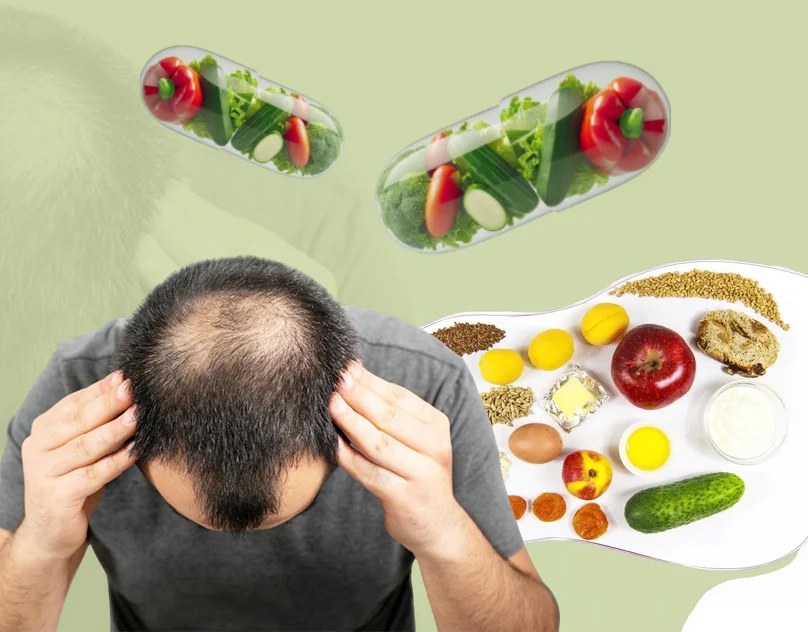

Food to Prevent Hair Fall: Understanding Your Genes and Diet
- The Indispensable Connection Between Diet and Hair Health
- List Of Food To Prevent Hair Fall
- The Role of Genetic Testing in Understanding Hair Fall
- Accuracy and Reliability of Our Genetic Tests
- Beyond Diet: Holistic Approaches to Prevent Hair Fall
- Conclusion: Nourishing Your Way to Healthier Hair
- Take Proactive Steps for Your Hair Health Today
Navigating the distress of hair fall is a challenging experience for one and all. Various factors are responsible for leading to conditions such as hair thinning and complete loss. Some of them include genetics, stress, and lifestyle. The nourishment we provide while our bodies play a pivotal role in sustaining healthy, vibrant hair.
This comprehensive guide delves into the essential foods to prevent hair fall and promote robust hair growth. Understanding such a crucial link that lies between nutrition and hair health shall empower you to make various informed dietary choices. This shall all support strength and resilience of the hair.
The Indispensable Connection Between Diet and Hair Health
Our hair follicles are made up of those tiny powerhouses. They are solely responsible for natural and healthy hair growth. They need a consistent supply of essential nutrients to function well. Just like any other part of the body, hair thrives on a balanced use of vitamins, minerals, and proteins.
However, deficiencies in such vital components can eventually weaken those hair strands. This weakness makes the hair brittle and prone to breakage, which ultimately leads to enhanced hair fall.
Conversely, a diet rich in specific nutrients can fortify hair follicles. Such a condition can stimulate the act of growth and can lead to overall hair health enhancement. Embracing a nutrient-dense approach to eat is a proactive step in the journey for preventing vigorous hair fall.
List Of Food To Prevent Hair Fall
Including specific foods into the daily diet can significantly contribute to preventing hair fall. Below we can explore some of the nutritional powerhouses with foods like:
Eggs:
Eggs are known as a protein and biotin bonanza: As we all know, hair is primarily made of keratin, which is a protein. And eggs are an excellent source of high-quality protein, which provides the building blocks for strong hair.
Furthermore, eggs are rich in biotin, which is a B-vitamin known for its crucial role in keratin production. Adequate biotin consumption is usually linked to lowered hair fall and enhanced hair thickness.
This shall include eggs in the breakfast or other meals can be a delicious and effective way for nourishing the hair.
Fatty Fish:
Omega-3s for Scalp Health: Fatty fish, including salmon, mackerel, and herring, are known for containing high levels of omega-3 fatty acids. Such essential fats might hold anti-inflammatory properties. They are to be held responsible in contributing to a healthy scalp.
You must aim to include fatty fish in your diet a couple of times a week so as to reap its hair-boosting benefits.
Spinach and Other Leafy Greens:
Nutrient-Rich Powerhouses: Spinach is known to be a nutritional powerhouse that is well loaded with vitamins and minerals that is essential for hair health. It holds a rich source of iron, vitamin A, vitamin C, and folate.
Iron deficiency is a common cause of hair fall, and spinach is one of the important food to prevent hair fall for the properties iron has.
Vitamins A and C are equally needed for sebum production, which keeps the scalp moisturized and further helps to hair to be healthy. Folate is known to play a vital role in cell growth, which includes hair follicle cells.
Incorporating spinach and some other leafy greens including kale and collard greens into the diet is a simple yet effective strategy for preventing hair fall.
Nuts and Seeds:
Essential Fatty Acids and Zinc: Consumption of nuts and seeds, like almonds, chia seeds, walnuts, and flaxseeds, are known to be excellent sources of essential fatty acids, zinc, and vitamin E.
Snacking on a handful of nuts or even about adding those seeds to the meals can be a delicious way for supporting hair health and at the same time it prevents hair fall.
Sweet Potatoes:
Beta-Carotene for Hair Growth: Sweet potatoes are rich in beta-carotene that the body might convert into vitamin A. Vitamin A is needed for the growth and maintenance of all cells, which also includes hair follicle cells.
Sweet potatoes as food to prevent hair fall can contribute to healthy hair growth and at the same time it helps in preventing hair fall.
Avocados:
Healthy Fats and Vitamins: Avocados are a creamy delight that are packed with healthy monounsaturated fats, vitamin E, and B vitamins. Healthy fats it holds, helps to keep the hair moisturized and prevent breakage. On the other hand vitamin E acts as an antioxidant, which shall protect the scalp.
B vitamins under food to prevent hair fall is crucial for various bodily functions, which also includes hair growth. Adding avocados to the salads, smoothies, or enjoying them on toast can be a nourishing way which supports hair and prevents hair fall.
Berries:
Antioxidant Power for Scalp Health: Berries including blueberries, strawberries, and raspberries are known to be rich in antioxidants, including vitamin C.
These antioxidants help to protect hair follicles from damage which are majorly caused by free radicals.
Vitamin C is also needed for collagen production that shall strengthen hair. Enjoying a daily serving of berries can further contribute to a healthy scalp, and it prove to be a good food to prevent hair fall.
Oats:
A Source of Zinc and Iron: Oats as food to prevent hair fall are a comforting and nutritious grain. They provide essential minerals including zinc and iron, these both components are crucial for hair health.
Zinc is known to support those hair tissue growth and repair, while iron can help to carry that oxygen to the hair follicles. Starting the day with a bowl of oats can be quite beneficial to nourish the hair and prevent hair fall.
Lentils and Legumes:
Plant-Based Protein and Iron: Lentils, chickpeas, and some other legumes are some great plant-based sources of protein, iron, zinc, and biotin.
Such nutrients are vital for sustaining strong, healthy hair, and it helps in preventing hair fall. This goes especially well for individuals following a vegetarian or vegan diet.
Incorporating lentils and legumes into your meals several times a week can provide a significant boost to good-quality hair health.
Greek Yogurt:
Protein and Pantothenic Acid: Greek yogurt is known to be a protein-rich food that has pantothenic acid (vitamin B5). This component is well linked to enhance hair follicle health. Protein is known to provide the building blocks for hair, including pantothenic acid, which further helps to strengthen hair and lower hair fall. Enjoying Greek yogurt as a snack or part of breakfast can contribute to healthier hair.
The Role of Genetic Testing in Understanding Hair Fall
While diet is known to play a significant role in preventing hair fall, genetics can also be a major contributing factor.
Genetic testing like helps from LifeCode can provide valuable insights into predisposition to types of hair loss like androgenetic alopecia (which is medically termed as male and female pattern baldness – MPB).
LifeCode proposes genetic tests analysing specific genes that are well associated with hair growth, hair density, and the likelihood of experiencing that hair-thinning-like condition.
On identifying the genetic predispositions, you can further gain a deeper understanding of individual risk factors for hair fall. Some of this mentioned knowledge shall empower you to perform proactive and personalized steps in managing hair health.
Accuracy and Reliability of Our Genetic Tests
LifeCode is committed to provide accurate and reliable genetic testing services. Our tests utilize advanced DNA sequencing technology, and they are conducted in all certified laboratories.
We further adhere to stringent quality control measures which ensures highest level of accuracy in results.
Our interpretation of your genetic data is completely based on the latest scientific research and is provided in a clear and easy-to-understand report manner.
Such report shall highlight your genetic predispositions which is related to hair fall and might offer some personalized recommendations with reference to lifestyle modifications and dietary adjustments. Such use of food to prevent hair fall shall support your hair health. It is important to remember that genetic predisposition does not guarantee hair loss, but on the other hand, it provides some valuable information about proactive management
Beyond Diet: Holistic Approaches to Prevent Hair Fall
While focusing on a nutrient-rich diet about food to prevent hair fall, adopting a holistic approach that encompasses other lifestyle factors can enhance your efforts:
Manage Stress:
Chronic stress can disrupt the cycle of hair growth and further it can contribute to hair fall. Incorporate such stress-reducing practices including meditation, yoga, or deep breathing exercises in your routine can help immensely.
Gentle Hair Care:
Avoid use of harsh shampoos, excessive heat styling, and tight hairstyles. These factors mentioned damage hair and lead to its breakage. Instead, you are suggested to make use of gentle hair care products and other helpful, delicate techniques.
Adequate Hydration:
Drinking enough amount of water is needed and is notably healthy for overall health. It also includes about sustaining a healthy scalp and hydrating those hair strands well.
Regular Exercise:
Exercise enhances blood circulation. This act can benefit the scalp and hair follicles.
Consider Supplements (with professional guidance):
In some of the cases, your healthcare provider may recommend specific supplements to address those nutrient deficiencies that might contribute to hair fall. However, it is also crucial to consult a professional before starting any of the supplementation.
Conclusion: Nourishing Your Way to Healthier Hair
Preventing hair fall is a multifaceted endeavour involving understanding of interplays with reference to lifestyle, genetics, and, most importantly, nutrition.
On incorporating a diverse range of nutrient-rich foods into daily diet, you can further provide hair follicles with essential building blocks, and this shall support the thrive.
Embracing a diet that is abundant in protein, omega-3 fatty acids, iron, zinc, biotin, and various vitamins and antioxidants can be food to prevent hair fall.
Remember that consistency is the key, and making gradual, sustainable alterations to those eating habits shall yield the best long-term outcome in the journey that lays towards luscious, resilient hair.
Take Proactive Steps for Your Hair Health Today
Understanding those individual risk factors can empower you to take targeted action for your hair health.
Book a genetic consultation with experts at LifeCode to discuss your concerns and explore how genetic testing can provide valuable insights into predispositions for hair fall.
Or, simply order a genetic testing kit (swab test) from the comfort of your home and embark on a journey to personalized hair care.
Gain a deeper understanding of your genetic makeup and receive tailored recommendations to support healthy hair growth and prevent hair fall.

Can You Inherit Migraine Risk The Truth About Women’s Brain Health
Can You Inherit Migraine Risk The Truth About Women’s Brain Health The Genetic Link to Migraines, It Is More Than Just Bad Luck Why Women are More...


Unlocking Your Body’s Blueprint: Genetic Clues to Pregnancy Complications and Hypertension
Unlocking Your Body's Blueprint: Genetic Clues to Pregnancy Complications and Hypertension The Intricate Dance of Genes and Health Decoding Pregnancy Complications Through Genetics The Genetic Roots of...

Education: Bachelor of Pharmacy (B.Pharm) from the Tata Institute of Social Sciences (TISS), Mumbai Experience: Agarwal is a seasoned pharmacist with over 7 years of experience in the pharmaceutical field. She has worked in various settings, including hospital pharmacies and community clinics, where she has excelled in medication management, patient counseling, and clinical support. Agarwal is known for her expertise in drug therapy optimization and patient safety. In addition to her practical experience, she contributes to health journalism, focusing on pharmaceutical advancements and health policy, and is involved in research projects aimed at improving medication practices and health outcomes. is known for her expertise in drug therapy optimization and patient safety. In addition to her practical experience, she contributes to health journalism, focusing on pharmaceutical advancements and health policy, and is involved in research projects aimed at improving medication practices and health outcomes.


